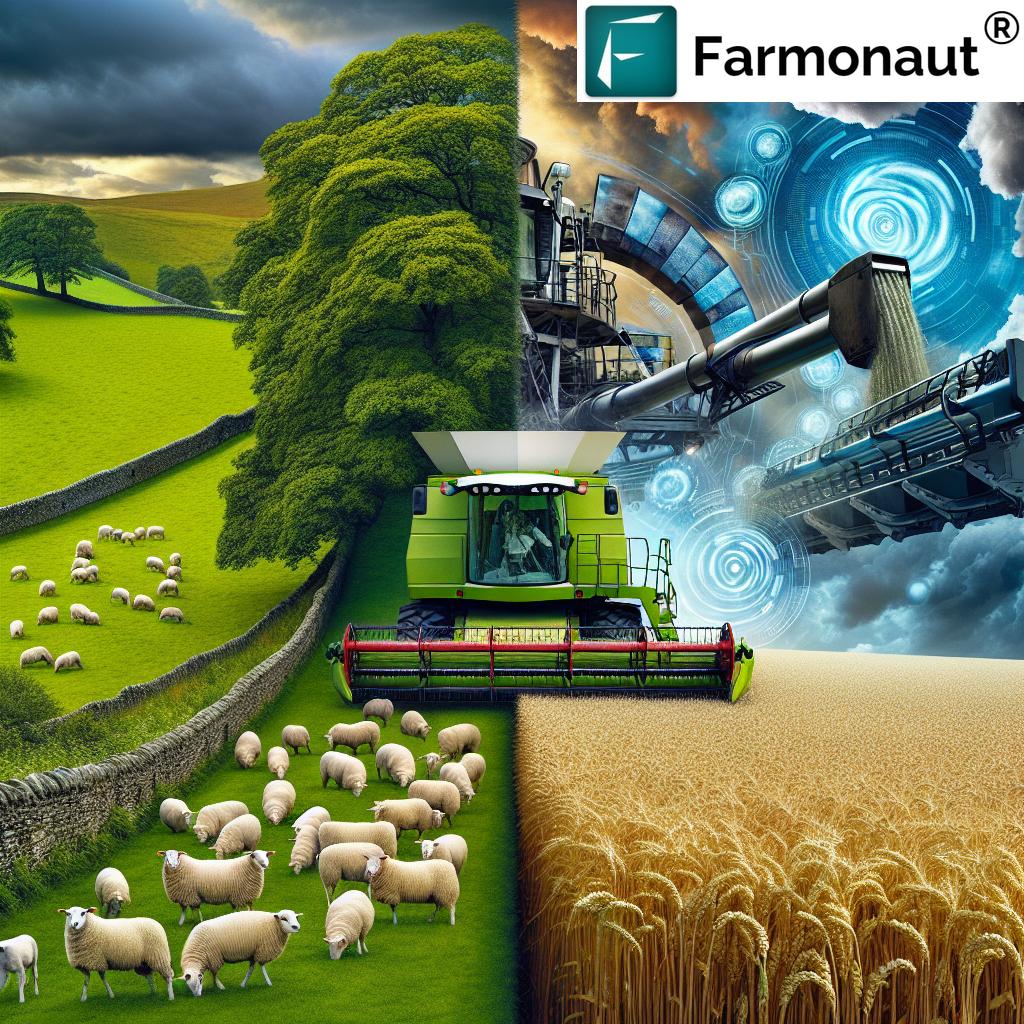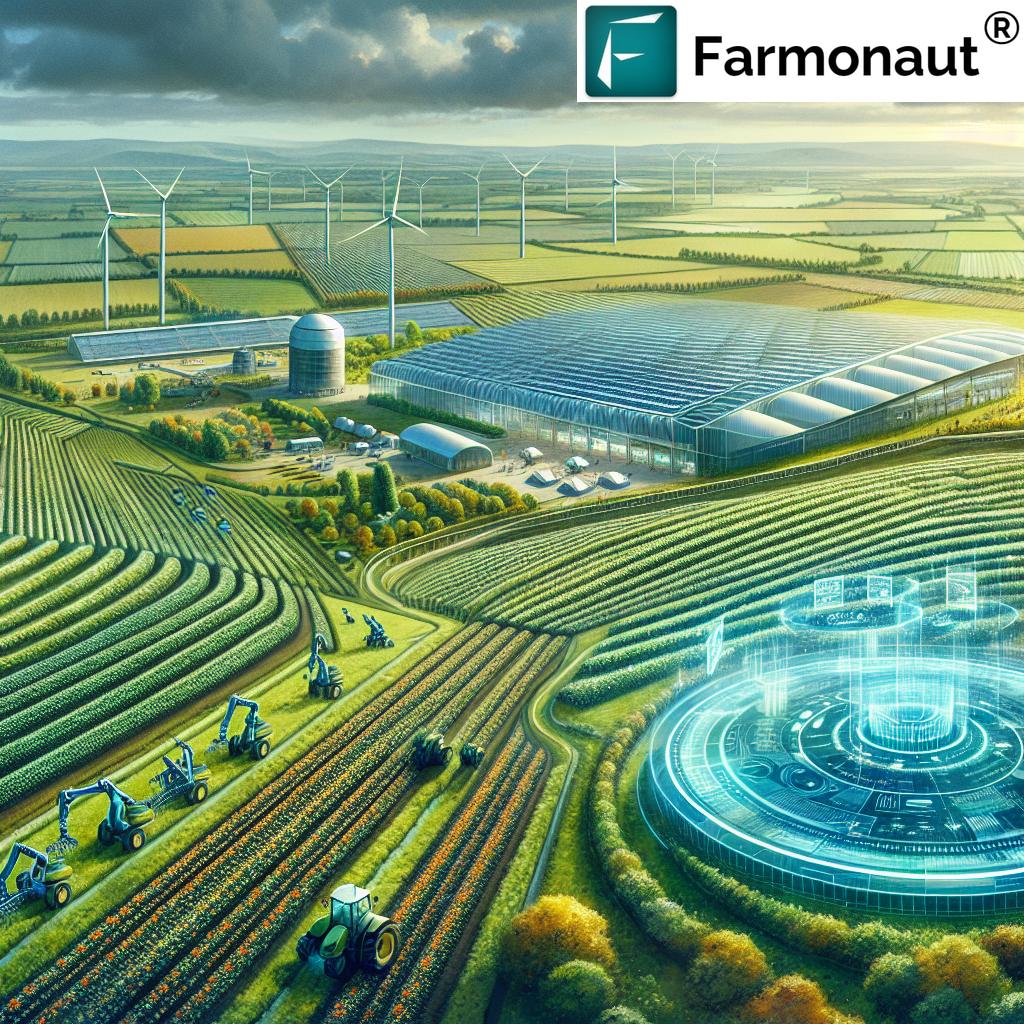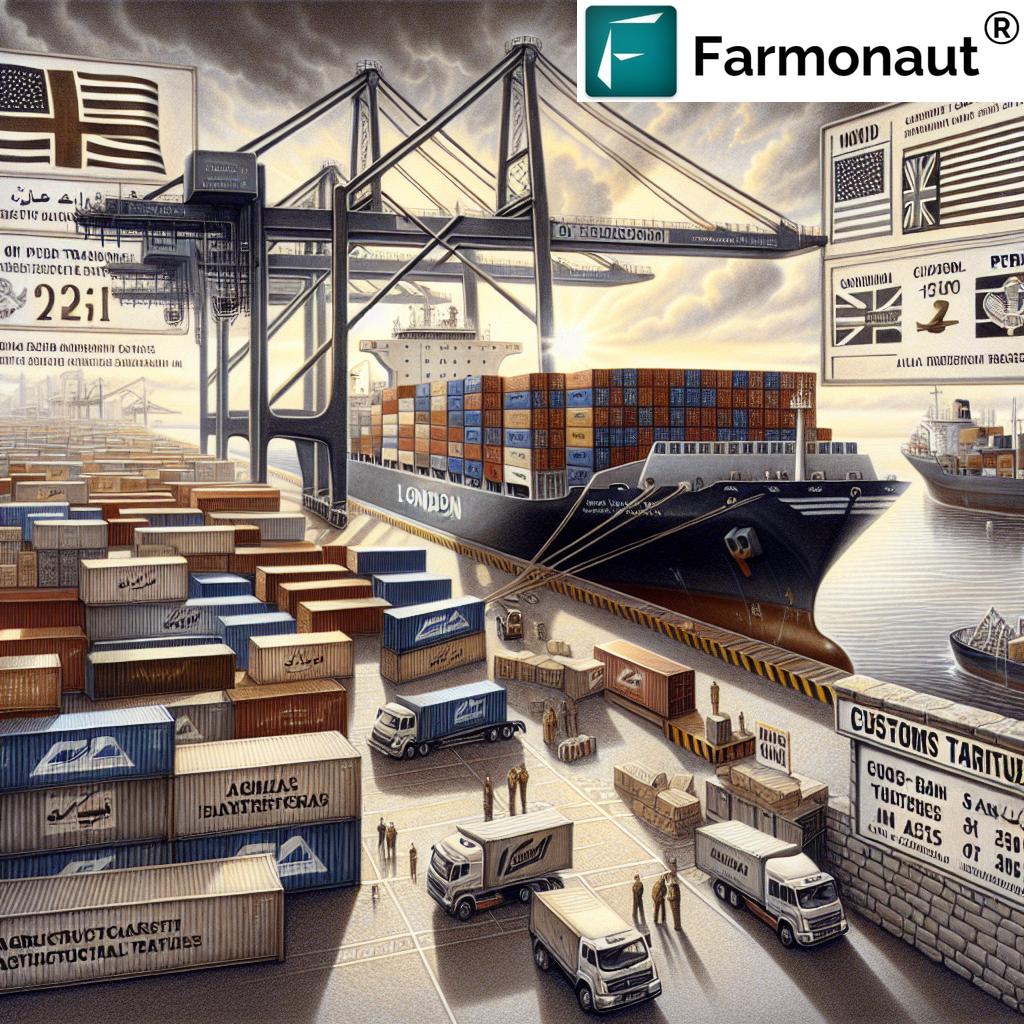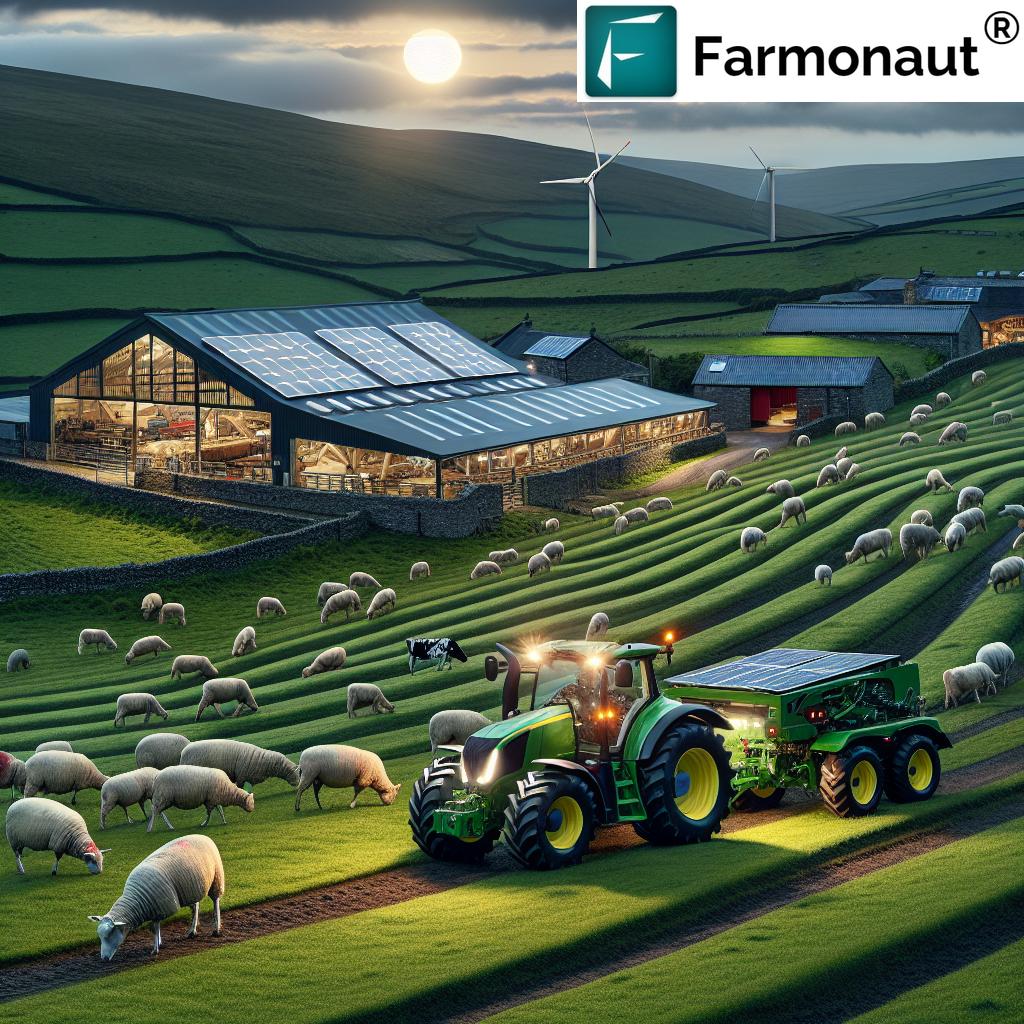Addressing UK’s Agricultural Labor Shortage: Sustainable Solutions for Food Security and Supply Chain Resilience

“Brexit’s impact on immigration led to a 4% decrease in EU workers in UK agriculture between 2017 and 2020.”
In recent years, the UK agricultural sector has faced a significant challenge that threatens to overshadow even the impacts of climate change and trade policies: a critical shortage of labor. This pressing issue has far-reaching consequences for food security, supply chain resilience, and the overall sustainability of British farming. As we at Farmonaut delve into this complex problem, we aim to explore its roots, impacts, and most importantly, sustainable solutions that can help secure the future of UK agriculture.
The Root of the Problem: Understanding the UK Agricultural Labor Shortage
The UK’s agricultural labor shortage is a multifaceted issue with several contributing factors:
- Brexit and Immigration Policy Changes: The UK’s exit from the European Union has significantly reduced the pool of EU workers who traditionally filled many agricultural roles.
- Aging Domestic Workforce: The British farming workforce is aging, with fewer young people choosing careers in agriculture.
- Seasonal Nature of Work: Many agricultural jobs are seasonal, making it challenging to maintain a stable workforce year-round.
- Perception of Agricultural Work: There’s often a negative perception of farm work as low-skilled and low-paid, deterring potential workers.
These factors have combined to create a perfect storm, leaving UK farms understaffed and struggling to maintain productivity levels.
Impact on UK Food Security and Supply Chain
The labor shortage in UK agriculture has far-reaching consequences:
- Reduced Crop Yields: Lack of workers leads to unharvested crops and reduced overall yields.
- Increased Food Waste: Produce that can’t be harvested in time often goes to waste in the fields.
- Supply Chain Disruptions: Labor shortages at farms can cause ripple effects throughout the food supply chain.
- Rising Food Prices: Reduced supply and increased production costs can lead to higher prices for consumers.
- Threat to Food Security: Dependence on imports may increase, potentially compromising national food security.
To address these challenges, we need to explore innovative and sustainable solutions that can help bridge the labor gap while ensuring the long-term viability of UK agriculture.
Technological Innovations: A Key to Addressing Labor Shortages
At Farmonaut, we believe that technology plays a crucial role in mitigating the impacts of labor shortages. Here are some innovative solutions that are transforming UK agriculture:
- Precision Agriculture: Using satellite imagery and AI to optimize resource use and increase efficiency.
- Robotic Harvesters: Automated machines that can harvest crops with minimal human intervention.
- Drone Technology: For crop monitoring, spraying, and even pollination in some cases.
- IoT Sensors: To monitor soil health, crop growth, and environmental conditions in real-time.
These technologies not only help address labor shortages but also contribute to more sustainable and efficient farming practices.
Our satellite-based crop health monitoring system at Farmonaut is an example of how technology can help farmers make informed decisions about irrigation, fertilizer usage, and pest management, ultimately optimizing crop yields and reducing resource wastage. By leveraging these technologies, UK farmers can maintain productivity even with reduced labor availability.
Sustainable Farming Practices: Enhancing Resilience
Adopting sustainable farming practices is another crucial strategy in addressing labor shortages and enhancing overall resilience in UK agriculture:
- Crop Diversification: Growing a variety of crops can spread labor needs more evenly throughout the year.
- Agroforestry: Integrating trees and shrubs into crop and animal farming systems can create more diverse and resilient ecosystems.
- Conservation Agriculture: Minimizing soil disturbance, maintaining soil cover, and rotating crops can reduce labor needs while improving soil health.
- Integrated Pest Management: This approach reduces reliance on chemical pesticides, potentially lowering labor requirements for spraying.
These practices not only help in managing labor shortages but also contribute to long-term sustainability and resilience in the face of climate change.

Agricultural Workforce Management Strategies
Effective workforce management is crucial in addressing the labor shortage. Here are some strategies that UK farms can implement:
- Skills Training and Development: Investing in training programs to upskill existing workers and attract new talent.
- Improved Working Conditions: Offering better pay, benefits, and working conditions to attract and retain workers.
- Flexible Work Arrangements: Implementing flexible schedules to accommodate workers’ needs and preferences.
- Partnerships with Educational Institutions: Collaborating with schools and universities to promote careers in agriculture.
By implementing these strategies, UK farms can create a more attractive and sustainable work environment, helping to address the labor shortage in the long term.
“UK farms experienced a 30% reduction in seasonal workers in 2021, threatening food security and supply chain resilience.”
The Role of Government and Policy
Government policy plays a crucial role in addressing the UK’s agricultural labor shortage. Some key areas where policy intervention can make a difference include:
- Immigration Policies: Developing tailored immigration schemes for agricultural workers.
- Investment in Agricultural Education: Funding programs to encourage more young people to pursue careers in agriculture.
- Support for Technological Adoption: Providing grants or tax incentives for farms investing in labor-saving technologies.
- Rural Infrastructure Development: Improving living conditions and amenities in rural areas to attract workers.
These policy measures can create a more supportive environment for UK agriculture to thrive despite labor challenges.
The Impact on UK Economy and Food Security
The agricultural labor shortage has significant implications for the UK economy and food security:
- Economic Impact: Reduced agricultural output can lead to lower GDP contributions from the sector.
- Food Price Inflation: Labor shortages can drive up production costs, leading to higher food prices for consumers.
- Increased Reliance on Imports: If domestic production decreases, the UK may need to rely more heavily on food imports.
- Rural Economic Decline: Labor shortages can contribute to the decline of rural economies that depend on agriculture.
Addressing the labor shortage is thus critical not just for the agricultural sector, but for the broader UK economy and food security landscape.
Explore Farmonaut’s API for agricultural data solutions
Innovative Solutions: The Role of Technology in Addressing Labor Shortages
At Farmonaut, we believe that technological innovation is key to addressing the UK’s agricultural labor shortage. Here are some ways technology is helping:
- AI-Powered Advisory Systems: Our Jeevn AI system provides real-time insights and expert crop management strategies, helping farmers make informed decisions with less manpower.
- Blockchain-Based Traceability: This technology can streamline supply chain management, reducing labor needs in tracking and verification processes.
- Fleet and Resource Management Tools: These help optimize the use of machinery and resources, reducing the need for manual labor in logistics and operations.
- Carbon Footprint Tracking: By providing real-time data on emissions, this technology helps farms become more sustainable while potentially reducing labor-intensive practices.
These technological solutions not only address labor shortages but also contribute to more efficient and sustainable farming practices.
Check out our API Developer Docs for integration details
The Future of UK Agriculture: Adapting to Change
As we look to the future, it’s clear that UK agriculture must adapt to overcome the challenges posed by labor shortages. This adaptation will likely involve:
- Increased Automation: Greater adoption of robotic and automated systems in farming operations.
- Shift in Crop Choices: Farmers may opt for crops that are less labor-intensive or more suitable for mechanical harvesting.
- New Business Models: We may see the rise of collaborative farming models that pool resources and labor.
- Integration of Data and AI: Leveraging big data and AI for more precise and efficient farming practices.
These changes represent both challenges and opportunities for UK agriculture, potentially leading to a more resilient and sustainable sector in the long term.
Impact on Consumers and Retailers
The agricultural labor shortage doesn’t just affect farmers; it has significant implications for consumers and retailers as well:
- Consumer Impact: Potential increases in food prices and changes in product availability.
- Retail Challenges: Retailers may face supply chain disruptions and need to source more products from international markets.
- Shift in Consumer Behavior: There may be increased interest in locally sourced and seasonal produce.
- Food Waste Concerns: Labor shortages could lead to increased food waste at the farm level, affecting the entire supply chain.
Understanding these impacts is crucial for developing comprehensive solutions that address the needs of all stakeholders in the food system.
Sustainable Solutions for a Resilient Future
Addressing the UK’s agricultural labor shortage requires a multifaceted approach that combines technological innovation, sustainable practices, and strategic policy interventions. Some key solutions include:
- Investment in AgriTech: Continued development and adoption of technologies like those offered by Farmonaut to increase efficiency and reduce labor needs.
- Promotion of Sustainable Farming: Encouraging practices that enhance soil health, biodiversity, and overall farm resilience.
- Workforce Development: Creating programs to attract and train new agricultural workers, especially young people.
- Policy Support: Government initiatives to support farmers in transitioning to more sustainable and less labor-intensive practices.
- Consumer Education: Raising awareness about the challenges in agriculture and the importance of supporting local, sustainable food production.
By implementing these solutions, we can work towards a more resilient and sustainable agricultural sector in the UK, one that can thrive despite labor challenges and contribute to long-term food security.
UK Agricultural Labor Shortage Impact and Solutions
| Impact Area | Current Challenge | Potential Solution | Estimated Benefit |
|---|---|---|---|
| Food Production | Reduced harvest yields | Automated harvesting technology | 20% increase in crop yield |
| Supply Chain Efficiency | Disruptions due to labor shortages | AI-powered supply chain management | 30% improvement in efficiency |
| Economic Impact | Reduced GDP contribution from agriculture | Investment in AgriTech and workforce development | 15% increase in sector productivity |
| Food Security | Increased reliance on imports | Promotion of local, sustainable farming practices | 25% reduction in food imports |
Conclusion: A Call to Action
The UK’s agricultural labor shortage is a complex challenge that requires collaborative efforts from farmers, technology providers, policymakers, and consumers. At Farmonaut, we’re committed to providing innovative solutions that can help address these challenges and build a more resilient agricultural sector.
By embracing sustainable farming practices, leveraging cutting-edge technology, and implementing strategic workforce management, we can overcome the current labor shortages and ensure a sustainable future for UK agriculture. It’s not just about maintaining food production; it’s about reimagining our food systems to be more efficient, resilient, and environmentally friendly.
As we move forward, let’s work together to support our farmers, invest in agricultural innovation, and make choices that contribute to a more sustainable and food-secure future for the UK. The challenges are significant, but so are the opportunities for positive change.
FAQs
- Q: How has Brexit impacted the UK’s agricultural labor force?
A: Brexit has significantly reduced the pool of EU workers who traditionally filled many agricultural roles in the UK, leading to a shortage of seasonal and permanent farm workers. - Q: What are some technological solutions addressing the labor shortage?
A: Technological solutions include precision agriculture using satellite imagery and AI, robotic harvesters, drone technology for crop monitoring, and IoT sensors for real-time environmental monitoring. - Q: How can sustainable farming practices help with labor shortages?
A: Sustainable practices like crop diversification, agroforestry, and conservation agriculture can spread labor needs more evenly throughout the year and reduce overall labor requirements. - Q: What role can the government play in addressing this issue?
A: The government can help by developing tailored immigration schemes for agricultural workers, investing in agricultural education, providing support for technological adoption, and improving rural infrastructure. - Q: How might the labor shortage affect food prices for consumers?
A: Labor shortages can lead to reduced crop yields and increased production costs, potentially resulting in higher food prices for consumers.



















